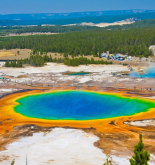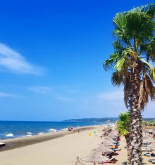Did you know that Tuvalu is a small country in Oceania comprised of nine islands with a population of less than 12,000 people? Additionally, did you know that one of their primary sources of revenue is from the sale of internet domains ending in “.tv”?
Tuvalu in Oceania
Tuvalu (previously known as the Ellice Islands) is a Pacific Ocean island republic located in the Polynesian subregion of Oceania. Its islands located roughly in the middle of the Pacific Ocean, between Hawaii and Australia. They are located east-northeast of Vanuatu, southeast of Nauru, south of Kiribati, west of Tokelau, northwest of Samoa and Wallis and Futuna, and north of Fiji. Tuvalu is comprised of three coral atolls and six reef islands. They are located between the latitudes of 5° and 10° south and 176° and 180° longitude. They are located in the western hemisphere, west of the International Date Line. Tuvalu’s population is 10,507 people (2017 census). Tuvalu’s total land area is 26 square kilometers (10 sq mi).
Tuvalu’s initial occupants were Polynesians, according to well-established beliefs concerning Polynesians migrating into the Pacific around three thousand years ago. Polynesians routinely traveled between islands by canoe long before European contact with the Pacific islands. Polynesian navigation abilities enabled them to organize sophisticated voyages in double-hulled sailing canoes or outrigger canoes.
Polynesians moved out from Samoa and Tonga into the Tuvaluan atolls, which acted as a stepping stone for future migration into the Polynesian outliers in Melanesia and Micronesia, according to scholars.
In 1568, Spanish sailor lvaro de Mendaa became the first European to travel through the archipelago, spotting the island of Nui on a search for Terra Australis. In 1819, Funafuti was renamed Ellice’s Island. Later on, following the efforts of English hydrographer Alexander George Findlay, the name Ellice was assigned to the entire group of nine islands. In the late nineteenth century, Great Britain asserted sovereignty over the Ellice Islands, claiming them as part of their sphere of influence following a contract between Great Britain and Germany delineating their respective zones of influence in the Pacific Ocean. Between 9 and 16 October 1892, Captain Gibson of HMS Curacoa established a British protectorate over each of the Ellice Islands. Britain appointed a resident commissioner to govern the Ellice Islands, which are considered to be a component of the British Western Pacific Territories (BWPT). They were controlled as part of the Gilbert and Ellice Islands colony from 1916 to 1975.
In 1974, a vote was held to determine if the Gilbert and Ellice Islands should be administered separately. The Gilbert and Ellice Islands colony ceased to exist legally on 1 October 1975, and the old government was officially dissolved on 1 January 1976, resulting in the formation of two new British colonies, Kiribati and Tuvalu. Tuvalu achieved complete independence as a sovereign state within the Commonwealth on 1 October 1978. Tuvalu joined the United Nations on 5 September 2000, becoming the 189th member.
Early contacts with other cultures
Tuvalu was discovered by Europeans on 16 January 1568, during the expedition of lvaro de Mendaa from Spain, who sailed through Nui and named it as Isla de Jess (Spanish for “Island of Jesus”), in honor of the previous day’s feast of the Holy Name. Mendaa attempted to land but was unable to do so. On 29 August 1595, during Mendaa’s second voyage across the Pacific, he crossed Niulakita, which he dubbed La Solitaria.
In 1764, during his circuit of the globe as captain of the Dolphin, Captain John Byron traveled through the Tuvalu Islands (1751). He designated the atolls as Lagoon Islands on his chart.
The first European sighting of Nanumea was by Spanish naval commander Francisco Mourelle de la Ra on 5 May 1781, while commanding the ship La Princesa on a southern Pacific transit from the Philippines to New Spain. Nanumea was mapped as San Augustin by him. Keith S. Chambers and Doug Munro (1980) identified Niutao as the island that Mourelle also passed on 5 May 1781, thereby resolving what Europeans referred to as The Gran Cocal Mystery. Mourelle’s map and notebook referred to the island as El Gran Cocal (‘The Great Coconut Plantation’), but the island’s latitude and longitude were unknown. At the time, longitude could only be calculated coarsely, as precise chronometers were not accessible until the late 18th century.
In 1809, Captain Patterson of the ship Elizabeth encountered Nanumea while transiting through northern Tuvalu waters on his way to China from Port Jackson, Sydney, Australia. In May 1819, Arent Schuyler de Peyster of New York, captain of the armed brigantine or privateer Rebecca, sailed through southern Tuvaluan waters under British flags. De Peyster discovered Nukufetau and Funafuti, which he dubbed Ellice’s Island in honor of an English politician named Edward Ellice, the Member of Parliament for Coventry and owner of the Rebecca’s cargo. All nine islands were given the name Ellice following the work of English hydrographer Alexander George Findlay.
Mikhail Lazarev, commander of the Mirny, paid a visit to Nukufetau in 1820. In May 1824, Louis Isidore Duperrey, captain of La Coquille, sailed past Nanumanga on his way around the world (1822–1825). On 14 June 1825, a Dutch expedition (the frigate Maria Reigersberg) discovered Nui and christened the main island (Fenua Tapu) Nederlandsch Eiland.
Whalers began traveling the Pacific, though they only reached Tuvalu occasionally due to the atolls’ poor landing conditions. The first whaler to hunt the waters surrounding Tuvalu was identified as American Captain George Barrett of the Nantucket whaler Independence II. In November 1821, he bartered coconuts with the residents of Nukulaelae and also paid a visit to Niulakita. He erected a shore camp on Nukufetau’s Sakalua islet, where he used coal to melt the whale fat.
Between 1862 and 1863, Peruvian ships engaged in the so-called “blackbirding” trade, which involved recruiting or impressing laborers, combed the smaller islands of Polynesia, from Easter Island in the eastern Pacific to Tuvalu and the Gilbert Islands’ southern atolls (now Kiribati). They wanted recruits to help alleviate Peru’s severe labor shortage. While some islanders were recruited voluntarily, the “blackbirders” were infamous for luring islanders onto ships using deceptions such as posing as Christian missionaries and kidnapped islanders at gunpoint. The Rev. A. W. Murray, Tuvalu’s first European missionary, reported that approximately 170 people were removed from Funafuti and approximately 250 from Nukulaelae in 1863, as there were fewer than 100 of the 300 residents on Nukulaelae in 1861.
Elekana, a deacon of a Congregational church in Manihiki, Cook Islands, became stranded in a storm and drifted for eight weeks until landing at Nukulaelae on 10 May 1861. Elekana began her missionary work by teaching Christianity. He received his education at Malua Theological College, a London Missionary Society (LMS) school in Samoa, before assuming responsibility for the establishment of the Church of Tuvalu.
The Rev. A. W. Murray of the LMS, a Protestant congregationalist missionary group, arrived in 1865 as the first European missionary; he also evangelized the Tuvaluans. By 1878, Protestantism had become fully entrenched, with preachers stationed on each island. In the late nineteenth and early twentieth centuries, the ministers of what became the Church of Tuvalu (Te Ekalesia Kelisiano Tuvalu) were largely Samoans, who had a significant influence on the development of the Tuvaluan language and music.
The islands fell under British influence in the late nineteenth century, when Captain Gibson of HMS Curacoa declared each of the Ellice Islands a British protectorate between 9 and 16 October 1892.
Main income comes from selling internet domains
Stephen Boland was sitting in his government office in 1995, working as the macroeconomic planner for the Pacific microstate of Tuvalu, when the fax machine began to whirr. It printed a phrase on its thermal paper that would eventually equate to a winning lottery ticket.
The communication was a dispatch telling Tuvalu that it had been assigned a country code top-level domain for its Internet addresses — the string of characters at the end of a URL, such as.com or.org. Tuvalu’s domain name happens to be “.tv,” the universal abbreviation for broadcast entertainment. At the time, neither Boland nor the rest of the staff understood the final implications of the moniker. They were concerned about a more important matter.
“We were all sitting around staring at this fax,” Boland said. “People were discussing ‘dot TV,’ and we were thinking, ‘What the hell is this Internet thing?'”
Nearly 25 years later, many people on the island are still unaware of the internet’s full potential, but its evolution has made Tuvalu’s.tv domain one of its most valuable assets. Tuvalu receives around 1/12th of its annual gross national income (GNI) via renting its domain to internet giants such as Amazon-owned streaming platform Twitch via the Virginia-based corporation Verisign. And when Tuvalu’s contract with Verisign expires in 2021, that percentage is expected to rise dramatically.
Tuvalu is a network of coral atolls and reef islands located midway between Hawaii and Australia. It has a population of approximately 11,000 people. Tuvalu was a protectorate of Britain’s Gilbert and Ellice Islands until 1978, when it gained independence. Funafuti, Tuvalu’s capital island, is an 11-mile crescent of coral that encircles a 106-square-mile lagoon. There is a single airport, a single bank, a single hospital, and a single road that traverses the entire atoll. From any point on the atoll, one can easily view across the entire island.
Tuvalu’s fishing sector and minimal agriculture produce insufficient food to sustain the microstate’s population, which survives primarily on imported products. Despite this disparity in food production, Tuvalu has a reasonably good standard of living. Adult literacy has increased to about 99 percent due to compulsory public education, and the World Bank ranks Tuvalu as an upper-middle-income economy, with territorial fishing rights accounting for the lion’s share of its GNI, accounting for an estimated $19 million in licensing fees in 2018. However, a large percentage of its revenue comes straight from the licensing of its.tv URL suffix, owing to the recent explosion in streaming services. As websites using the.tv extension gain popularity, Tuvalu’s domain name on the web may ultimately eclipse that of its oceans.
Few Tuvaluans have access to.tv-powered streaming services. While the Internet is readily accessible throughout the country, it is limited to a satellite connection with limited streaming capacity. However, with over 140 million users worldwide watching video on Twitch.tv and other streaming sites, the financial benefits have benefited Tuvalu in ways other than entertainment. (Amazon owns Twitch, and Amazon’s CEO, Jeff Bezos, also owns The Washington Post.)
“[.tv] has offered a stable source of revenue,” claimed Seve Paeniu, Tuvalu’s Finance Minister. “It helps the government to provide important services to its citizens by providing schooling and education for children, medical care for our citizens, and also by enhancing the economy’s basic infrastructure and service delivery to our communities.”
To commercialize.tv, Tuvalu’s government signed a series of agreements allowing international corporations to advertise the top-level domain for commercial purposes. The current agreement, inked in 2011, requires Verisign, a Virginia-based network infrastructure company, to pay Tuvalu around $5 million each year for the right to administer.tv. This is a significant benefit for a country whose annual domestic revenue hovers around $60 million.
Tuvalu’s deal with Verisign expires in 2021, allowing for renegotiation between the two parties. With the perceived worth of.tv being boosted by the success of Twitch.tv and other services — owing to a persistent and significant increase in esports and video game streaming — a new deal might be a boon for Tuvalu.
Verisign has also benefited from the.tv domain. Verisign is essentially a supplier of domain names in its capacity as a registry. It defines domain name extensions, establishes standards for their use, and authorizes businesses — registrars such as GoDaddy or Dynadot — to sell domain name registrations directly to customers. It’s difficult to quantify exactly how much Verisign profits each year from its control of.tv, but a look at some of the figures involved provides context.
Verisign has not disclosed the precise amount of.tv URLs registered. DomainTools counts 500,700.tv domains, while Domain Name Stat counts 470,102. Both of these estimations are based on a tally of visible sites rather than total registered domains.
Verisign charges registrars a $7.85 annual fee for each.com domain registered through its registry. Premium top-level domains, such as.tv, are more expensive; while the exact rate for.tv is not publicly known, registrars reported a 12 percent price rise in 2017. A document acquired by The Post revealed one example of a site charging slightly more than $100 per year for the continuous registry and upkeep of its.tv address. According to experts, the running cost of Verisign’s registry is projected to be $1 per domain each year.
One figure is unquestionable: Verisign’s domain registry operation generated $1.21 billion in revenue in 2018, according to the company’s investor report.
“We are proud of our long-standing connection with the Tuvaluan administration and the work we’ve done to assist in the country’s development.
tv domains are among of the world’s best entertainment venues,” a Verisign employee explained. Additionally, the corporation manages additional popular domains such as.com,.net,.gov, and.edu.
However, the Tuvalu–Verisign relationship has not always been cordial, which may pave the path for Tuvalu to seek more compensation for the domain licensing contract.
In quest of a fresh arrangement
Prior to the two parties’ 2011 contract renegotiation, former Finance Minister Lotoala Metia referred to Verisign’s annual.tv payments — then $2 million a year — as “peanuts.”
Paeniu’s tone is more conciliatory, yet he maintains the same mentality as his predecessor. “At the end of the day, concessions are necessary, and thus, at the time, we arrived at this arrangement,” Paeniu said of the 2011 negotiations. “At the moment, that is unacceptable in my opinion – we could have negotiated a better arrangement.”
Boland concurs.
“This is an extremely underutilized resource that Tuvalu could be profiting from significantly more if it had someone on its side to fight for it, some sort of IT–streaming expert who understood the ins and outs of a decent arrangement,” Boland said.
Paeniu and his colleagues have been keeping a close eye on the perceived worth of.tv as the numbers surrounding streaming entertainment have exploded. Twitch’s average concurrent viewership climbed by 1,580 percent between September 2012 and December 2019 (77,798 to 1,229,122). Twitch had 3,386 partnered channels in 2012; it now has over 27,000. In terms of larger streaming service numbers, Cisco forecasted in 2017 that online video would account for 82% of all web traffic by 2021, the year of the scheduled.tv renegotiation.
If Tuvalu does not receive a reasonable offer, it may choose to license the.tv domain to one of Verisign’s competitors, such as Neustar or Afilias.
“Under the current arrangement, Tuvalu has been disadvantaged in capitalizing on the arrival of these online streaming services and the potential additional revenue that such services could provide in relation to the.tv deal,” Paeniu explained. “Moving forward, the Tuvalu administration intends to renegotiate the pact when it expires in about a year.”
While Tuvalu is hopeful for a successful renegotiation with Verisign, Paeniu stated that Tuvalu will consider proposals from other businesses to manage.tv in 2021. “Our goal is to maximize our gain from this.”
Another inflow on the horizon?
While usage statistics for.tv are unknown, the overall use of country code top-level domains is increasing. Total registrations of this type of top-level domain climbed by 6% year over year, according to Verisign’s August 2019 domain name industry brief. Although.tv is not one of the top ten largest country code top-level domains, it has grown in popularity in recent years.
Twitch.tv is leading the charge. Twitch has staked its claim to streaming supremacy on the fast increasing world of gaming and esports content. This tactic has thus far paid off: with 9.36 billion hours viewed in 2018, Twitch has begun to catch up to cable news networks such as Fox News and MSNBC in terms of audience.
Twitch is by far the most popular.tv website, and the only one that ranks in the top 50 of Alexa. However, many of its competitors have registered their own.tv URLs. DisneyPlus.tv redirects users to the main Disney website; similarly, Netflix.tv, Hulu.tv, YouTube.tv, and Amazon.tv do the same thing. As long as Twitch retains its prominence,.tv will continue to exist. And now Tuvalu’s administration is cognizant of the stakes.
“I believe the fight [for greater licensing costs] should have begun in 2011,” Boland stated. “Even at that point, it was abundantly evident what was happening with the development of top-level domains, broadcasting, and streaming, and all those types of things… all the skill and information, all the knowledge, appeared to be living with Verisign.” Tuvalu possessed quite minimal expertise and knowledge of the market in question. As a result, a very asymmetrical type of negotiation occurs.”
Regardless of the outcome of future negotiations, citizens of Tuvalu should soon be able to launch their own Twitch channels and join the streaming frenzy to which their government has been financially connected. Plans to establish an undersea fiber optic connection in Tuvalu are ongoing thanks to a World Bank grant, significantly enhancing the country’s bandwidth and Internet connectivity.
“At that point,” Paeniu continued, “maybe our community and people would directly benefit from the internet streaming services that.tv will be able to provide.”



